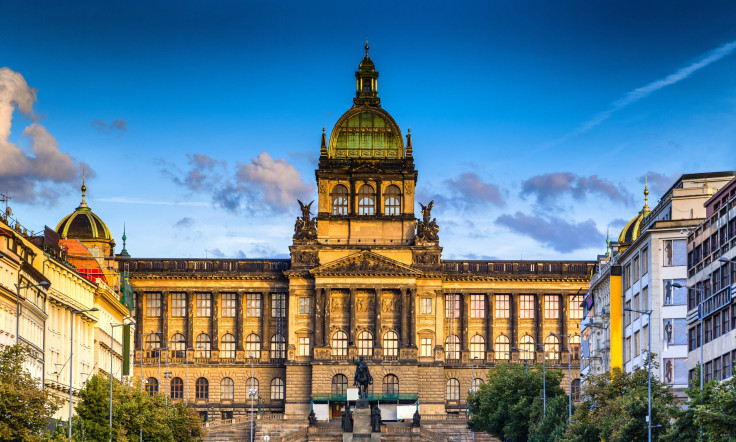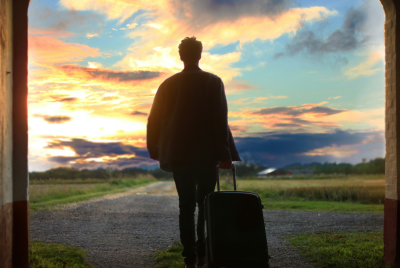Prague Wants 'More Cultured, Wealthier Tourists', Bans Bar Crawls To Discourage Drunk Tourists
Prague plans to ban late-night bar crawls to change its party destination image.

Prague has introduced a ban on organised pub crawls to reshape its tourism image and address residents' frustrations. The new regulations, which come into force in November 2024, aim to reduce the number of intoxicated, disruptive tourists—many of whom participate in stag and hen parties—while encouraging more refined, wealthier visitors. The city hopes this move will preserve its cultural heritage and offer a more pleasant experience for locals and tourists.
According to CNN, Prague's popularity as a destination for bachelor and bachelorette parties can be attributed to its affordability and vibrant nightlife. Low-cost airlines make it easy for tourists, particularly from the UK, to reach the Czech capital, known for its low-priced beer, lively nightclubs, and beautiful architecture. British tourists have flocked to Prague for budget-friendly party trips for years, contributing to its reputation as a go-to spot for stag and hen parties.
Tensions Between Locals and Tourists
Prague has seen an unprecedented surge in tourism over the past two decades. In 2023, the city welcomed 7.4 million visitors; in just the first quarter of 2024, it received 4.1 million. This sharp increase is a significant jump from 2000 when only 2.6 million tourists visited the city annually. While this boom in tourism has brought economic benefits, it has also strained Prague's infrastructure and overwhelmed the narrow streets of the city's historic district, Prague 1.
Home to landmarks like Old Town Square, the Charles Bridge, and Prague Castle, Prague 1 has become a prime area for pub crawls and nightlife activities. Residents of this district, exhausted by the noise and disorder caused by late-night revelry, have consistently called on local authorities to take action. According to ITV News, the mounting complaints from locals, particularly regarding noise pollution, prompted the city to introduce stricter regulations on night-time drinking tours.
Prague Cracks Down on 'Nightlife' Tourism
The Prague 1 Municipal District Office has banned organised pub crawls and drinking tours between 10 p.m. and 6 a.m., starting in November 2024. This decision is part of a larger strategy to shift Prague's tourism focus from alcohol-fuelled parties to more sophisticated cultural experiences. The city's Deputy Mayor, Jiri Pospíšil, has been vocal about attracting wealthier, more cultured tourists who stay longer and engage more respectfully with the city's cultural offerings.
According to CNN, Pospíšil noted that the ban is intended to deter tourists who come to Prague solely for its nightlife and cheap alcohol. There have even been discussions about banning bachelor party costumes in public spaces as part of the city's effort to improve its image. This initiative follows growing concerns that excessive alcohol consumption during pub crawls is harming Prague's reputation and driving away other types of tourists.
Protecting Prague's Image and Reputation
The Czech newspaper Ceske Noviny reported that local authorities are particularly concerned about how drunken, rowdy behaviour negatively impacts Prague's standing as a leading European destination. They worry that the city's association with disruptive party tourism is damaging its image among more affluent and culturally inclined visitors and potential investors. The ban on pub crawls is seen as an essential step in restoring Prague's reputation as a culturally rich city rather than a destination known only for its nightlife.
The head of the Czech Association of Hotels and Restaurants, Vaclav Starek, has clarified that the ban is not a prohibition on pubs or their operating hours. Instead, it targets organised pub crawls that have become synonymous with drunken behaviour and late-night disturbances. Starek reassured the public that local bars would still be able to operate as usual but without the organised tours that often exacerbate noise and disorder.
Increasing Tourist Tax to Fund City Improvements
To complement these new restrictions, Prague has also raised its tourist tax to further capitalise on its booming visitor numbers. In 2022, the overnight stay tax was increased from CZK 21 (£0.69) to CZK 50 (£1.65) per person per night. This tax reform generated a record-breaking CZK 801 million in 2023, which is being reinvested into projects to enhance the city's infrastructure and improve the overall tourist experience.
According to Pospíšil, the funds collected from this tax will support initiatives designed to attract higher-spending tourists more likely to stay longer and contribute to the local economy more sustainably. This move aligns with Prague's broader goal of shifting from short-term party tourism to a more refined and culturally focused visitor base.
Shifting Tourism Trends: From Spain to Turkey
Prague is not the only city looking to shift its tourist demographic. Other popular party destinations, such as Ibiza and Malaga in Spain, also feel the strain of mass tourism. According to an IBTimes UK report, locals in Malaga have begun protesting against the overwhelming influx of tourists, with some even posting signs telling visitors to "go f*cking home." This backlash is part of a growing movement across European tourist destinations, where locals demand more regulation and control over tourism that disrupts their daily lives.
As a result, alternative destinations like Bodrum, Turkey, are emerging as popular options for British tourists seeking cheaper and less crowded party spots. Bodrum offers lower alcohol prices, affordable accommodation, and a lively nightlife, leading some to dub it the "new Ibiza." With more tourists flocking to Bodrum, it is expected to see over five million visitors in 2024 alone.
© Copyright IBTimes 2025. All rights reserved.






















